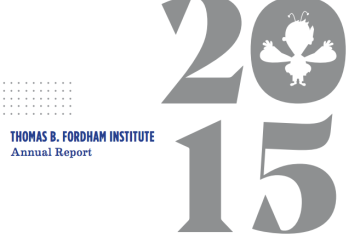
The Every Student Succeeds Act significantly improves upon No Child Left Behind by, among other things, giving more power back to states and local schools. We’re working to help policymakers and educators take advantage of the law’s new flexibility, especially when it comes to creating smarter school accountability systems, prioritizing the needs of high-achieving low-income students, and encouraging the adoption of content-rich curricula.
Resources:
- Rating the Ratings: An Analysis of the 51 ESSA Accountability Plans
- Leveraging ESSA to Support Quality-School Growth
- Great ideas from our ESSA Accountability Design Competition
- What ESSA means for high-achieving students
- ESSA and a content-rich education
- ESSA and parental choice


Introducing the Fordham Institute’s 2015 Annual Report
Michael J. Petrilli 2.29.2016
NationalFlypaper

How to fix reading in the era of ESSA
Robert Pondiscio 2.24.2016
NationalFlypaper

Educators' perspectives on Common Core implementation
Amber M. Northern, Ph.D. 2.24.2016
NationalFlypaper

Beyond multiple choice tests
Amber M. Northern, Ph.D., Victoria McDougald 2.24.2016
NationalBlog

Evaluating the Content and Quality of Next Generation Assessments
2.22.2016
NationalBlog

Implementing the Every Student Succeeds Act toward a coherent, aligned assessment system
Jessica Poiner 2.17.2016
NationalFlypaper

New Common Core assessments measure the most important content in the standards
Morgan Polikoff 2.17.2016
NationalBlog

Steering and rowing in the age of ESSA
2.17.2016
NationalFlypaper

ESSA Accountability Design Competition: My big takeaways
2.16.2016
NationalFlypaper

Designing accountability systems to avoid NCLB-era mistakes
2.16.2016
NationalFlypaper

States: Don’t leave K–3 accountability behind under ESSA
Elliot Regenstein 2.16.2016
NationalFlypaper